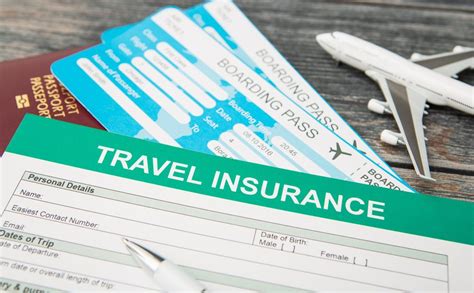Flight Insurance Worth It

Flight insurance, a form of travel insurance designed specifically for air travel, has become a common offering to travelers around the world. But is it worth the extra cost? As with any insurance product, the value of flight insurance depends on various factors, including your personal circumstances, the coverage provided, and the likelihood of needing to make a claim. This comprehensive guide aims to unravel the complexities of flight insurance, offering an in-depth analysis to help you make an informed decision.
Understanding Flight Insurance

Flight insurance, often bundled with broader travel insurance policies, provides coverage for a range of potential issues that may arise during air travel. This can include medical emergencies, trip cancellations or interruptions, baggage loss or delay, and even death or dismemberment during the flight.
The coverage and benefits of flight insurance policies can vary widely, so it's crucial to carefully review the terms and conditions before purchasing. Some policies may offer comprehensive coverage for a wide range of incidents, while others might have more limited benefits or specific exclusions.
Types of Flight Insurance
Flight insurance comes in several types, each designed to cover different scenarios:
- Trip Cancellation/Interruption Insurance: This covers expenses incurred if you need to cancel or interrupt your trip due to a covered reason, such as illness, injury, or weather-related events.
- Medical/Health Insurance: This provides coverage for medical emergencies that occur during your trip, including transportation to a medical facility and repatriation if necessary.
- Baggage Insurance: It covers the cost of lost, stolen, or damaged baggage and personal items during your journey.
- Accidental Death & Dismemberment (AD&D) Insurance: As the name suggests, this policy provides a benefit in the event of accidental death or dismemberment during air travel.
Some flight insurance policies offer a combination of these coverages, while others may be more specialized. It's essential to understand the specific coverage provided by the policy you're considering to ensure it aligns with your travel needs.
Factors to Consider Before Purchasing Flight Insurance

Before deciding whether to purchase flight insurance, it’s crucial to assess a few key factors:
Your Existing Insurance Coverage
Many individuals already have some form of insurance coverage that might overlap with the benefits offered by flight insurance. For instance, your health insurance plan may already cover medical emergencies while traveling, and your homeowner’s or renter’s insurance might provide some protection for your personal belongings, even when you’re away from home.
It's important to review your existing policies to understand the gaps in coverage that flight insurance might help fill. For example, if your health insurance has high deductibles or doesn't cover medical emergencies abroad, flight insurance with medical coverage could be a valuable addition.
The Cost of the Policy
Flight insurance can vary significantly in price, depending on the coverage provided, the duration of the trip, and the age of the traveler. Generally, policies with more comprehensive coverage will cost more. It’s important to compare prices and coverage options from different providers to find the best value for your needs.
The Likelihood of Needing to Make a Claim
Consider the likelihood of experiencing an event that would trigger a claim. For example, if you’re traveling to a politically stable country with a low crime rate and you have no pre-existing medical conditions, the chances of needing to make a claim for medical or theft-related issues might be relatively low.
However, if you're traveling to a region with known political unrest or you have a medical condition that could flare up during your trip, the potential need for flight insurance coverage might be higher.
Benefits of Flight Insurance
Flight insurance can offer several key benefits to travelers:
Peace of Mind
Perhaps the most significant benefit of flight insurance is the peace of mind it provides. Knowing that you’re covered in the event of an emergency or unexpected event can reduce the stress and anxiety associated with travel, allowing you to fully enjoy your trip.
Financial Protection
Flight insurance can provide financial protection against a range of potential issues. For example, if you have to cancel your trip due to a covered reason, trip cancellation insurance can reimburse you for prepaid, non-refundable expenses. Similarly, if you suffer a medical emergency while abroad, medical insurance can cover the potentially high costs of treatment and transportation.
Enhanced Medical Care
When traveling abroad, particularly to countries with different healthcare systems, medical insurance can provide access to higher-quality medical care. This can be crucial in the event of a serious illness or injury.
Potential Drawbacks of Flight Insurance
While flight insurance offers several advantages, there are also some potential drawbacks to consider:
Cost
Flight insurance can be an additional expense, especially for longer trips or for travelers who already have comprehensive health and property insurance coverage.
Exclusions and Limitations
Flight insurance policies often have specific exclusions and limitations. For example, some policies may not cover pre-existing medical conditions or may have age limits for certain types of coverage. It’s crucial to read the fine print to understand what’s covered and what isn’t.
Redundancy
If you already have comprehensive insurance coverage through your health, home, or auto policies, some aspects of flight insurance might be redundant. For instance, if your homeowner’s insurance covers your personal belongings worldwide, you might not need the baggage insurance component of a flight insurance policy.
Comparing Flight Insurance Options

When comparing flight insurance policies, several key factors should be considered:
Coverage Limits
Review the coverage limits for each type of insurance provided. For example, check the maximum payout for trip cancellation, the daily benefit limit for medical expenses, and the value of coverage for baggage loss.
Exclusions
Carefully read the policy’s exclusions to understand what events or circumstances won’t be covered. This can help you decide if the policy is a good fit for your specific travel needs.
Provider Reputation
Research the reputation of the insurance provider. Check online reviews and ratings, and consider the company’s financial stability. You want to ensure that the provider is reputable and has a good track record of paying claims promptly.
Claims Process
Understand the claims process, including what documentation you’ll need to provide and how long it typically takes to process a claim. A straightforward and efficient claims process can be a significant advantage.
Real-World Examples and Case Studies
Let’s look at a few real-world examples to illustrate the potential value of flight insurance:
Case Study 1: Medical Emergency
Imagine you’re traveling to Europe and suffer a serious illness that requires hospitalization. Without medical insurance, you could face significant out-of-pocket expenses for treatment and transportation back home. However, with medical insurance coverage, these costs would be covered, providing financial relief during a stressful situation.
Case Study 2: Trip Cancellation
You’ve planned a dream vacation to an exotic destination, but a few weeks before your departure, a family member falls ill, and you have to cancel your trip. With trip cancellation insurance, you can recover the significant costs of your non-refundable airfare, hotel bookings, and other prepaid expenses.
Case Study 3: Baggage Loss
On a business trip, your checked luggage is lost by the airline. Without baggage insurance, you would have to bear the cost of replacing all your business attire and equipment. However, with baggage insurance, you can be reimbursed for these expenses, minimizing the financial impact of the loss.
Performance Analysis and Industry Insights
According to industry data, the global travel insurance market, which includes flight insurance, is expected to reach USD 38.25 billion by 2027, growing at a CAGR of 13.8% from 2022 to 2027. This growth is driven by increasing international travel, rising health awareness, and the desire for financial protection during trips.
| Year | Market Value (USD Billion) | Growth Rate (%) |
|---|---|---|
| 2022 | 18.15 | 10.5 |
| 2023 | 20.49 | 12.9 |
| 2024 | 23.28 | 13.6 |
| 2025 | 26.57 | 14.1 |
| 2026 | 30.39 | 14.4 |
| 2027 | 38.25 | 13.8 |

Expert Tips and Recommendations
Here are some expert tips to help you make the most informed decision about flight insurance:
Assess Your Risks
Evaluate the specific risks associated with your trip. Consider factors such as the destination, the duration of your stay, and any pre-existing medical conditions. This will help you determine the type and level of coverage you need.
Compare Multiple Policies
Don’t settle for the first flight insurance policy you find. Compare several options from different providers to find the best coverage at the most competitive price.
Read the Fine Print
Always read the policy documents carefully to understand the coverage, exclusions, and limitations. Pay close attention to the definitions of covered events and the conditions for making a claim.
Consider Your Existing Coverage
Review your existing insurance policies to understand what’s already covered. This will help you identify any gaps in coverage that flight insurance could fill.
Choose a Reputable Provider
Select an insurance provider with a strong financial rating and a good reputation for customer service and claim handling. This will give you peace of mind that your claim will be handled fairly and efficiently if the need arises.
Conclusion
Flight insurance can provide valuable protection and peace of mind for travelers. By carefully considering your specific needs, comparing policies, and understanding the coverage provided, you can make an informed decision about whether flight insurance is worth it for your next trip.
Frequently Asked Questions
Can I purchase flight insurance after my trip has started?
+Generally, flight insurance policies must be purchased before your trip begins. Most policies have a requirement that you purchase the insurance within a certain time frame of booking your flight or before your departure date. It’s important to check the specific terms of the policy you’re considering to understand the eligibility requirements.
What happens if I need to make a claim for flight insurance?
+The claims process can vary depending on the insurance provider and the type of claim. Typically, you’ll need to provide documentation to support your claim, such as medical records, police reports, or receipts for prepaid expenses. It’s important to review the specific claims process outlined in your policy to understand what’s required.
Are there any situations where flight insurance won’t cover my claim?
+Yes, flight insurance policies often have specific exclusions. Common exclusions include pre-existing medical conditions, acts of war or terrorism, and intentionally self-inflicted injuries. It’s crucial to review the exclusions in your policy to understand what isn’t covered.
Can I get flight insurance if I have a pre-existing medical condition?
+Some flight insurance policies may provide coverage for pre-existing medical conditions, but it often comes at an additional cost or with certain restrictions. It’s important to disclose any pre-existing conditions when applying for insurance and to understand the specific terms and conditions related to these conditions.
What’s the difference between flight insurance and travel insurance?
+Flight insurance is a type of travel insurance that specifically covers incidents related to air travel, such as trip cancellations, baggage loss, and medical emergencies during the flight. Travel insurance, on the other hand, is a broader term that covers a wider range of travel-related issues, including flight-related incidents, but also accommodations, activities, and more.


